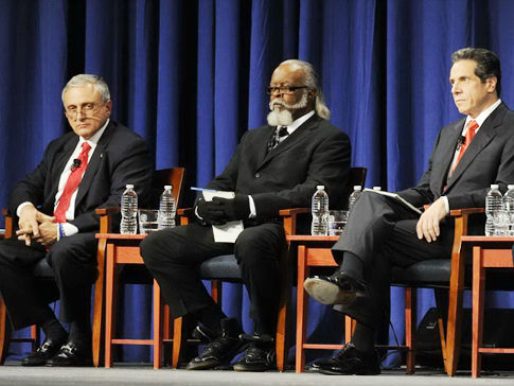New York's gubernatorial debate and the bipolar disorder of the two-party system

On Monday evening, all seven ballot-qualified candidates for governor of New York participated in a debate which propelled an eccentric third party candidate into the national spotlight and ignited a much-needed discussion about the role of such debates in our political culture.
In addition to the Democratic and Republican party nominees, Andrew Cuomo and Carl Paladino, the event featured Green Party candidate Howie Hawkins, Libertarian Warren Redlich, Kristin Davis of the Anti-Prohibition Party, Charles Barron of the Freedom Party, and Jimmy McMillan, running on the Rent is Too Damn High ballot line. In the estimation of reporters and commentators nationwide, it was none other than Jimmy McMillan who “stole the show.” With his strong stage presence, elaborate beard and black gloves, the fast-talking advocate of working families and small businesses clearly eclipsed his gubernatorial rivals in the minds of many observers.
However, the mainstream and corporate media have, in many cases, been highly critical of the event for including what they call “fringe candidates” in the forum. An editorial in the New York Times last week denounced the inclusive format and called for a “face-off” that would exclude everyone but the Democratic and Republican candidates for the office, apparently on the basis that ballot-qualified third party candidates do not deserve a fair hearing of their ideas. Similarly, a columnist for the New York Daily News derided the “idiotic format”, apparently in the belief that the candidates of the Democratic and Republican parties represent something other than the reproduction of the failed status-quo.
Of course, partisans of the political establishment are always wary of anything that draws attention to the fact that there are indeed alternatives to the candidates of the Democratic and Republican parties. They unabashedly prefer exclusive debates like the one held last week in California between the Democratic and Republican candidates for governor. The Green Party’s gubernatorial nominee, Laura Wells, was not only excluded from participating in the event like all the other candidates for the office, she was even arrested for attempting to attend it as a spectator! Fortunately, however, there are many people in this country who recognize the inherent value of inclusive debates. In an article for The New Republic, Bradford Plumer demands, “More Fringe Candidates, Please!” He writes:
“Against all odds, this may have been the most informative, high-minded political debate of the cycle. Because there were so many candidates, each one had only a short time to speak, so everyone had to stay sharp and on message. And for the most part, they couldn't veer off into personal attacks.”
At the Rochester City Newspaper, Jeremy Moule summed up a number of substantive proposals forwarded by Green Howie Hawkins and Libertarian Warren Redlich, and faulted the mainstream media for its superficial coverage of the race, writing:
“Third-party candidates often get the major party candidates to address and discuss issues they'd otherwise leave alone. But their voices have been absent this election season, most likely because the coverage is being driven by Paladino. Last night's debate gave New Yorkers a glimpse of what they've been missing.”
Advocates of closed debates, in which only the Democratic and Republican party candidates are allowed to participate, can often be found arguing that it makes no sense to include candidates who will not win the election. Taking this position to its logical conclusion, we may as well do away with elections altogether, as if they were nothing more than a mere formality. Nancy Allen, a Green Party activist and long-time advocate of open debates, emphasizes the importance of the free exchange of ideas in a healthy democratic republic.
“This isn’t only about the right of Green and other alternative party candidates to participate in debates. It’s about the right of voters to hear from all the candidates whose names will be on the ballot. It’s about the right of voters to know which candidate best represents their interests,” Allen states in a press release from the Green Party.
How can you know which candidate would best represent your interests if the majority of candidates are excluded from debates and candidate forums, and are simply ignored by the mainstream media? Democrats and Republicans would have us believe that they best represent the people’s interests. What partisan wouldn’t? But, judging from the national mood, there is scant evidence for such a bold assertion. In a multi-polar society like ours, the bipolar Republican-Democrat duopoly simply flies in the face of common sense and democratic values.




